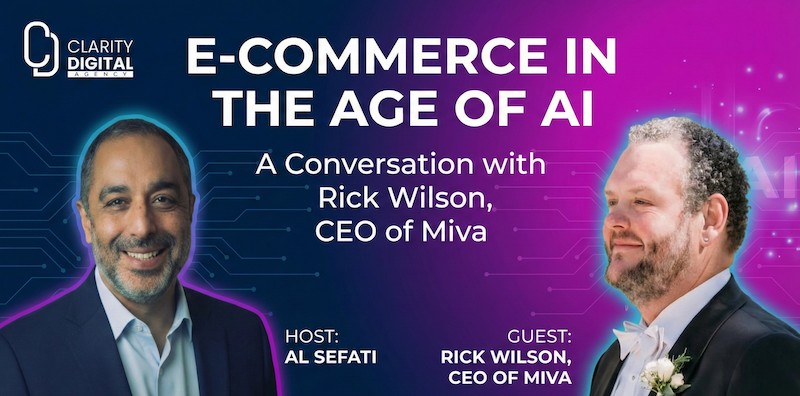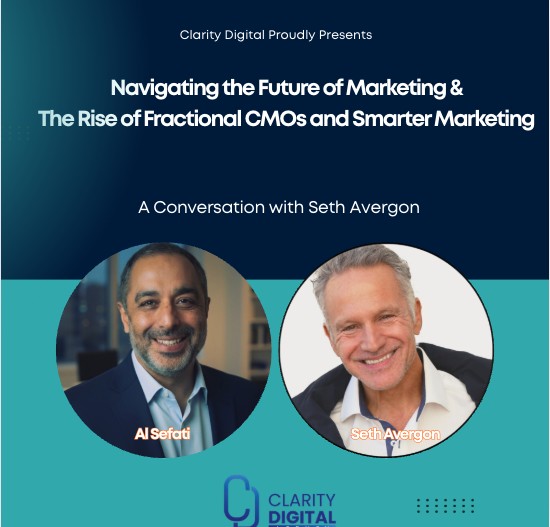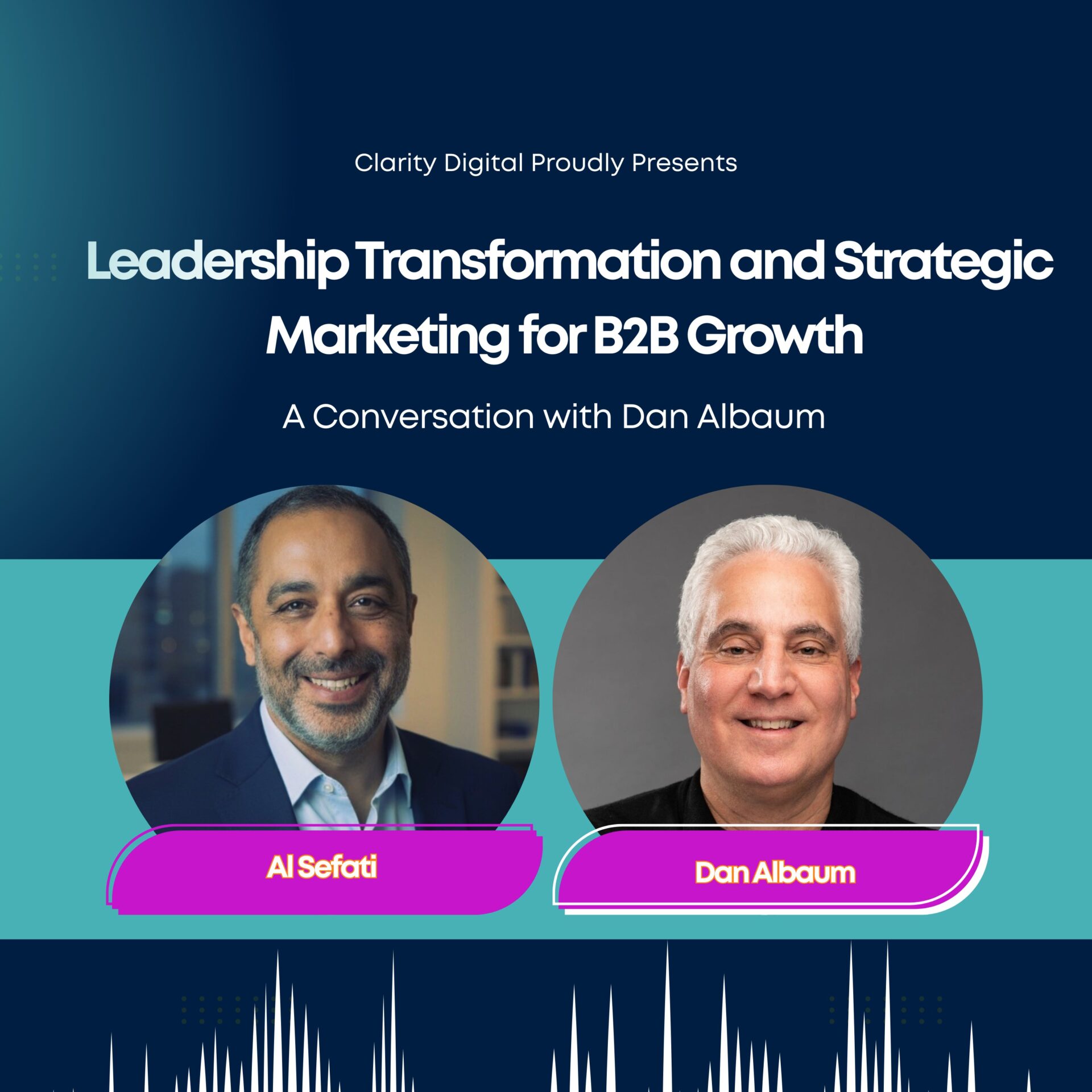Summary :
In a recent episode of the Clarity Digital Podcast, host Al Sefati sat down with Paige McCrensky to discuss the powerful intersection of data, storytelling, and marketing innovation. They explored the role of authentic brand values, cultural nuances, AI-driven personalization, and how businesses can stay ahead in the ever-evolving digital landscape. This blog post dives into their insightful conversation, offering key takeaways on how marketers can leverage data for compelling storytelling and business success.
Paige McCrensky’s Background and Expertise
Paige McCrensky has over 20 years of experience in marketing, having worked with major brands like Getty Images, Bloomberg, American Express, Martini Media, and Robb Report. She began her career at Ogilvy, where she developed a strong foundation in consumer behavior and research. Recently, she launched the Storytelling Catalyst Group, a consultancy focused on helping brands connect with audiences through strategic storytelling.
Paige’s passion lies in data-driven storytelling—translating raw data into engaging narratives that resonate with target audiences. She emphasizes the importance of understanding cultural and generational nuances, as well as using AI to personalize marketing efforts effectively.
The Role of Data in Storytelling
Data plays a foundational role in storytelling, but as Paige points out, it’s not just about numbers—it’s about asking the right questions and presenting data in a meaningful way. Marketers need to interpret data to uncover insights that inform and enhance brand storytelling.
Instead of relying on a one-size-fits-all approach, companies must personalize content for different audience segments. For example:
- Gen X prefers factual and nostalgic content.
- Boomers want direct and clear messaging.
- Gen Z seeks interaction, humor, and messages related to social issues.
Understanding these distinctions helps brands craft messages that truly connect with their target demographics.
AI-Powered Personalization and Its Challenges
AI has revolutionized personalization in marketing, but it comes with challenges. While AI-driven tools allow marketers to automate and scale personalization, they can sometimes miss the mark. Paige underscores the need for data validation—ensuring that AI-driven recommendations align with actual consumer behaviors and preferences.
She suggests continuously analyzing data from sources like McKinsey, Deloitte, Kantar, and agency trend reports to stay ahead of changing consumer behaviors. AI should assist, not replace, human creativity in developing marketing strategies.
The Attention Economy and the Need for Relevance
Consumer attention spans have drastically declined, dropping from 12% to 8% in the last four years. The average person checks their phone 114 times a day, making it harder for brands to capture and maintain audience attention.
To break through the noise, marketers must deliver relevant and culturally attuned content. TikTok and other social platforms have accelerated culture, making it imperative for brands to keep up with trends while staying authentic to their identity.
The Importance of Authenticity in Marketing
Authenticity is the cornerstone of effective marketing. As Paige highlights, the definition of authenticity has evolved over the years. Consumers, especially younger generations, expect brands to stand for something beyond profits.
At Getty Images, Paige worked on visual storytelling, emphasizing that people process images 90% faster than text. Choosing the right visuals is crucial to evoking emotions and establishing authenticity.
She recalls how, during the COVID-19 pandemic, commercials depicting people hugging felt out of touch. This highlights the importance of timing and cultural awareness in storytelling—what was considered authentic a year ago may no longer resonate today.
The Rise of Cultural Marketing
Understanding cultural nuances is critical for building strong brand connections. Paige explains that traditional multicultural marketing focused on blending identities, whereas today’s approach celebrates individuality and representation.
She cites an initiative she led at Getty Images in partnership with Citi—the DE&I Storytelling Guidebook, which examined media representation across nine global markets. Findings showed that diverse representation leads to increased brand trust and purchase intent.
For example, in India, most beauty advertisements featured lighter-skinned women, despite the country’s diverse skin tones. Brands that reflect real consumers in their messaging and visuals foster stronger engagement and brand loyalty.
Bridging Marketing and Customer Experience
Marketing doesn’t stop at the point of sale. Paige stresses that companies must ensure that customer experience, product quality, and after-sales service align with their marketing messaging. She shares an example of a luxury car purchase—if the customer service post-purchase is impersonal, it undermines the brand’s storytelling efforts.
Marketing teams should collaborate with customer service, product development, and operations to maintain brand consistency across all touchpoints. By integrating data insights from reviews, service interactions, and social media, businesses can refine their storytelling and improve customer retention.
Making Data Visualization More Engaging
Data is often presented in dry bar graphs and pie charts. Paige recommends infographics, animations, and interactive visuals to make data-driven storytelling more engaging. Platforms like Looker and Tableau offer strong visualization tools, but AI-powered solutions could further enhance how insights are communicated.
Al Sefati introduced Julius.AI, a tool designed to simplify data analysis and visualization. Paige expressed interest in testing such tools to improve storytelling with compelling visuals.
The Role of AI in Marketing
AI is a powerful tool for automation, brainstorming, and content refinement, but it still requires human oversight. Paige frequently uses ChatGPT for structuring ideas but always customizes and verifies AI-generated content before using it.
She warns about AI-generated stereotypes, sharing an example where AI produced highly sexualized real estate agent visuals—a clear sign that generative AI often reflects outdated biases. Marketers must carefully curate AI-generated content to ensure accuracy and inclusivity.
Staying Ahead in a Rapidly Changing Landscape
Marketers must keep up with trends while avoiding the shiny object syndrome—the tendency to chase every new technology. The key is to experiment, learn, and refine strategies based on real data rather than adopting new tools just for the sake of innovation.
Paige and Al agree that networking, attending conferences, and engaging in industry discussions are invaluable for staying ahead. The real magic happens in conversations, collaborations, and knowledge sharing.
Navigating Political and Social Climates in Marketing
Brands often face pressure to respond to social and political issues, from holiday messaging to diversity initiatives. Paige emphasizes that brands should stay true to their core values rather than react impulsively to external pressures.
For example, during Black Lives Matter, Getty Images launched a scholarship program to digitize historically significant photos, aligning with its core mission of visual storytelling. This was an authentic way to contribute rather than making a generic public statement.
Closing Thoughts
Marketing is evolving at an unprecedented pace, with data, AI, cultural awareness, and storytelling playing crucial roles in brand success. Paige McCrensky’s insights reinforce that brands must be:
- Data-informed but not data-obsessed—use multiple sources to validate insights.
- Authentic and culturally aware—represent real consumers in branding.
- Consistent across all touchpoints—from marketing to post-purchase experiences.
- Selective with AI adoption—balance automation with human creativity.
As we look ahead, marketers must embrace continuous learning, test new approaches, and stay grounded in their brand values. For those interested in working with Paige, she can be reached on LinkedIn (@PaigeMcCrensky), where she offers consulting, workshops, and fractional CMO services.
This episode of the Clarity Digital Podcast was a reminder that storytelling is not just about words—it’s about meaning, connection, and impact.





